You can’t write if you don’t read. Unfortunately, so much of what I read are quick-hit articles tied to my trade. On my phone. On the toilet. It’s an improvement over Twitter at least.
In 2021 I was disgusted at the low number of books I’d completed. (There were some highlights, like Mark Twain’s The Innocents Abroad, which positively rules, and the fifth of Frank Herbert’s Dune novels, a bit turgid at times, but sprinkled zestfully with some of the more unusual prurient passages I’ve come across.)
This year, I hope, I will do better. Not that it’s a race or anything, but, as my wife can attest, I do find that reading away from a computer screen puts me in a better mood. To that end, I challenge myself to finish 52 books this year. I did this once before in my life, and succeeded. (I believe I hit 55.)
Naturally, not all books are made equally. Some are designed to be shot back in one go, others you drag around for three weeks. And then there are times when life is so chaotic you hardly have time to tie your shoes while some days there’s just you, a chair, and freedom. I am going to work under the assumption that it will all balance out, so for every slim volume, there’ll be a rich, meaty text that can only be cooked on a slow flame. Wish me luck.
JANUARY
1) Deep Blues (1981), Robert Palmer
I have had a used, paperback copy of this book in my ownership since around 1998 or 1999. It was recommended to me by a good friend who later got his PhD in ethnomusicology, so his suggestions about ethnomusicology were not to be ignored. I got it from an outdoor bookseller in Union Square Park. Three dollars? Four? Something in that ballpark.
It’s a terrifically told tale about the origins of Mississippi Delta Blues and its migration up to Chicago and, eventually, to the ears of white folk and its transformation into classic rock. Howlin’ Wolf, Muddy Waters, Sonny Boy Williamson (both of them!), and Albert King are just some of the characters, and the locations include the broadcasting booth at Helena, Arkansas’s KFFA, the Dockery Plantation (where, this book argues, what we think of when we think of “the Blues” was created), and, yes, “The Crossroads” where Robert Johnson sold his soul to the Devil. This book is rich with stories, but not sappy; it’s myth but also history, and I can’t say enough good things about it.
2) Between Friends (2012), Amos Oz
I got this book quite recently, in autumn 2021 in the used bookstore that makes up the basement floor of Hudson, N.Y.’s Time & Space Ltd. (TSL) arts facility made out of a converted bread factory. (Perhaps you saw this fictionalized in the motion picture A Bread Factory, shot on location.) I don’t remember the precise cost, but it was already cheap, but even cheaper if you purchased X amount of books that day, which my wife and I did.
I’ve read two of Oz’s books before this, the absolutely magnificent and sweeping A Tale of Love and Darkness, which was made into a pretty lousy movie by Natalie Portman, and a collection of his essays and reporting previously printed in the leftwing Israeli newspaper Haaretz called In The Land of Israel, in which the author visited the Levant’s version of “the sticks,” and also areas under occupation in the West Bank. The writing dates to the 1980s but swap out the names of a few politicians and activist groups (let’s use that term loosely) and it could have been written yesterday. Or ten years from now, sadly.
Between Friends is sad and also hilarious. It is set prior to 1967, at a secular, very-left kibbutz. It’s really just a series of sketches about the people who live there. Each story focuses on one person, but all tend to pop up again later. There are fathers-and-sons, fathers-and-daughters, middle aged teachers with some of those daughters, the gardener hopelessly addicted to bad news, and, my favorite, the ancient, Wandering Jew, who has known a lifetime a suffering we can’t ever surmise, convinced that the world would be free of woe if we only just learned Esperanto.
This short book is incredible.
3) Jews and Words (2012), Amos Oz and Fania Oz-Salzburger
I don’t recall how this book ended up on my shelf, but I’ve had it for a few years. A whole book about the relationship between Jews and texts. “The People of the Book.” Unfortunatley, I didn’t really care for it. It wasn’t bad; it was interesting, but not that interesting, considering how great the back flap made it seem. (It has a terrific cover, too, of two reading chairs easily recognizable as father and daughter.) Much like the recent book Jewish Comedy: A History by Jeremy Daube, I think my expectations were sky high, so reality was a bit of a let down. I did learn a few things, though.
4) John Henry Days (2001), Colson Whitehead
I first heard about this book back when it was published in 2001, via Vin Scelsa’s radio program, Idiot’s Delight. It’s quite likely that he read an excerpt, as he did in those days. I jotted the title down, but, if the sticker on my hardcover copy is to believed, I didn’t actually buy it until after February 13, 2007. The sticker is from The Strand, which is funny, because there is a scene set in The Strand and it features people selling their review copies for cash. I did not know I was playing my part in some art-reflecting-life all those years ago.
I’ll share something else. At some point between Vin’s reading and my purchase, I have a distinct memory of going to the now-closed Barnes and Noble near Astor Place to buy this book. I couldn’t find it under “W” in fiction, so I asked someone who worked there. He said “ah, yes, I think we may have that, let’s check in African-American fiction.” Despite having heard about it on the radio, I did not know that the author was Black. Either Scelsa never mentioned it, or I didn’t hear it. I guess most people looking for that book would have known, at some point between 2001 and 2007, to look in that section. It wasn’t in stock, anyway.
So what about John Henry Days itself? It’s fucking brilliant. As a freelance writer with nearly 15 years under my belt (Lord, Lord) I am naturally interested in stories about … freelance writers. Though I was sobbing at what magazine rates were in those days, and how lush the junkets were. I’ve had my experiences on other people’s dimes (thank you forever, Battleship, a movie I have never seen, for that trip to Hawaii, and that stay in a hotel room that lists well over a grand each night) but wow I would have enjoyed the 1990s.
That aspect (plus scenes set at the thinly-veiled offices of the Village Voice, plus the East Village lit haunt KGB) were natural pleasures, but all told this is a rich and thoughtful examination of American history, pop culture through the decades, unexamined racial ghosts, and also how to drive steel through a mountain. You read a novel like this and frequently have to get out of your seat and pace around the room, flabbergasted that words on a page can transform into such divine, vivid sequences. At least I do.
FEBRUARY
5) Conversations With Elie Wiesel (2001), Elie Wiesel and Richard Heffner
I first discovered this book, in hardcover, soon after its publication at The Jewish Museum shop on 5th Avenue. I did not buy it, but not long after, when I joined through-the-mail Netflix, I was delighted to see that the episodes (independently produced sessions of Heffner’s decades-long public television program The Open Mind) was available to rent. I think it was three discs. Basically it’s Heffner lobbing Wiesel with somewhat vague questions about enormous ethical topics, warmly starting many of them with an “Elie, my friend.” A voice from behind kind eyes and a comforting mustache. Though these conversations happened before (and I mean just before) the 9/11 attacks, I remember, even though I didn’t watch this until at least two years later, this being a somewhat revelatory viewing experience for me. Elie Wiesel, not to put too fine a point on it, gives marching orders on how to live a righteous life no matter the odds.
One day in late January of this year, I realized that much of The Open Mind is available to Archive dot org. You wanna watch an hour with pretty much any public intellectual of the 20th century, it’s waiting for you. Anyway, this got me to thinking about those old discs, and I came across this book again. I bought it on that rotten website named for a South American river that can get you a used book for pennies in no time at all.
It isn’t a transcript. It’s a sculpted conversation. And it’s brilliant, of course, but I hardly need sell you on that. But what I had forgotten is just how funny it is.
There’s a recurring bit, if you can call it a bit. Basically, Heffner asks something that boils down to “are you saying we must always remain optimistic in the face of human suffering?” and Wiesel fires back “No! Of course not! But we have to try!” They volley this back 100 times. What I found myself doing was reading Elie’s lines (and he does most of the talking) not in his voice, but a voice that felt very familiar to me. A Jewish voice, but not with a Mitteleuropean accent. Eventually it hit me: I was hearing The Rabbi Nachtner, the second rabbi from A Serious Man. I could not tell if this was righteous or not, but it made for an added amusing element on the subway.
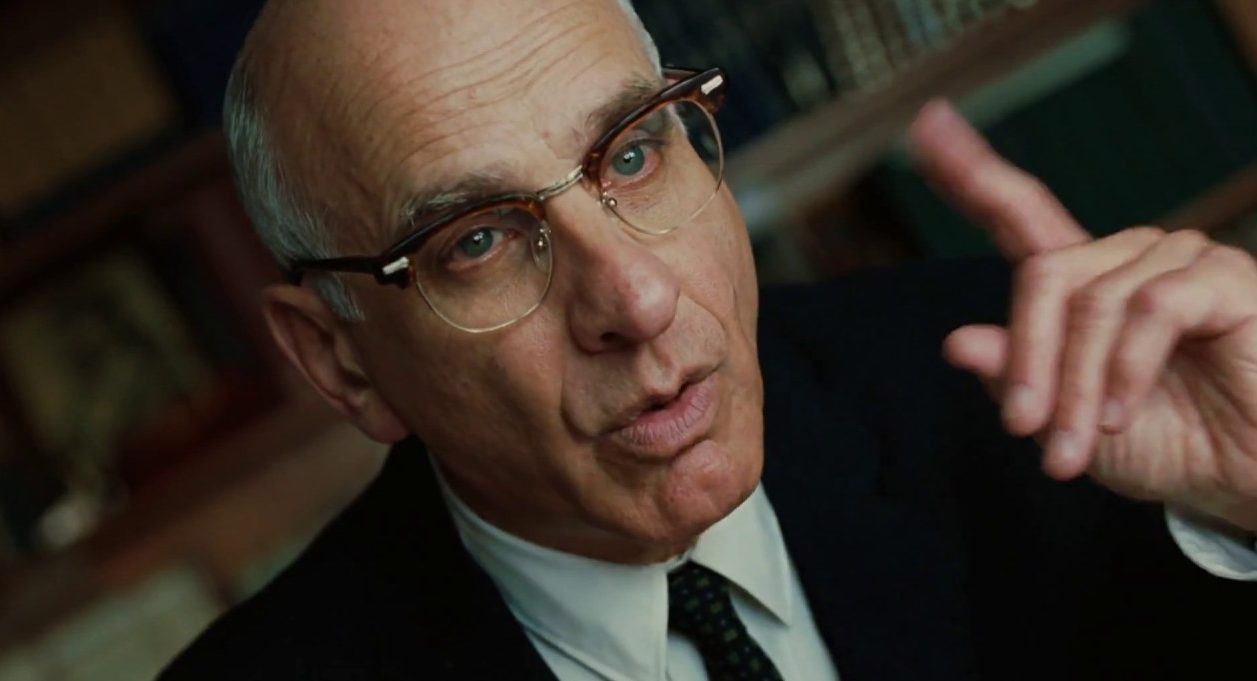
6) Pipe Dreams: The Urgent Global Quest to Transform the Toilet (2021), Chelsea Wald
I read a review of this book in an issue of Science Times, a periodical I subscribe to and usually let collect dust on my desk. (I’m strongly considering letting the subscription lapse.) It is about sanitation and health and the developing world, but, so I was told, also served as a history of the act of defecation. I am drawn to books about topics you wouldn’t think to write a book about, so I had to get ahold of this.
As advertised, this well-researched and intelligent tome is absolutely full of shit. Some sequences actually had me gagging. It’s hilarious. I know so much more about sewers and drainage than I did before, and I am agog (and aghast!) at the scientists who have a game plan for solving the world’s troubles with recycled human waste. Growing crops is just the beginning. You end up on their side, clucking your tongue at silly civilians too grossed out to join the crusade, then realize, no, I would never, ever want to live in an apartment complex powered by farts. I once stayed a week in Costa Rica at a lovely beach paradise where, after we checked in, we discovered one does not flush toilet paper, but you put it in a little bin, just out there in the open, in full view of the sink and your toothbrush. That was enough for me.
7) The Other Side of the Sky (1949-1958), Arthur C. Clarke
Another staggering collection of Clarke stories from the (mostly) pre-Sputnik era. I’ve read a different one, Tales from the White Hart, which includes a fun wraparound gimmick set at a pub based on one that no longer exists called The White Horse. (I did not know this on a recent trip to London, and got all excited when I thought I’d spotted the real White Hart!)
Anyway, not every one of these stories connects, but most do. “Venture To The Moon” from 1956 was probably my favorite, some typically “hard SF” getting into the mundane aspects of what a Lunar trip would be like. He got a lot wrong, but he got a lot right, too. “The Other Side of the Sky” is similarly into the nitty gritty of life on a space station, and it’s a lot less retro-future than you might think. (Some of the other stories, like the quite randy “Cosmic Casanova,” while hilarious, is, um, problematic, as they say.)
A few of the stories are barely even stories. They are just scenes. Even in his best novels, like Childhood’s End, Clarke has this recurring device of introducing you to a character, giving him (almost always a him) loads of backstory, having him accomplish one thing, then shoving him off stage never to be heard from again. (I mean, this is kinda Dr. Floyd in 2001, no?) Weirdly, I like this. The science part of Clarke wants solely to get his cosmic ideas across, but the fiction part is like “well, if I must involve pesky humans, let’s take a step and make them interesting.” His stories have this in spades.
8) Phish’s A Live One (2015), Walter Holland
Part of the 33 1/3 series. I don’t know why it took me so long to read (nay, devour) this. Walter Holland makes a case for Pat Metheny being a bigger influence on Trey Anastasio than I’d considered before. No one wants to hear me talk about Phish, so I’ll just say this was a treat.
MARCH
9) Fuzz: When Nature Breaks The Law (2021), Mary Roach
The best way to sum up this book is to say “intensely NPR.” Whether that is a recommendation or not is up to you. The section about the U.S. Navy trying, and failing, to remove gooney birds from Midway Atoll is extremely amusing.
10) My Michael (1968), Amos Oz
The older this book gets the less tethered it is to its political specificity (e.g. Israel in the 1950s) which only improves it. There’s not much of a plot here—a woman is sad, basically—but it’s engrossing. My mother had a copy published in 1971 that I yanked off her shelf and brought to my home a few years ago. When I finally cracked it open it didn’t just have “old book smell” it reeked and was making me ill. But I’d already read the first few pages, so I went on (sigh) Amazon and bought a newer used copy for $2.99 plus shipping.
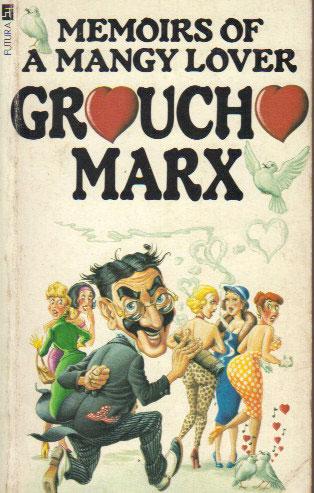
11) Memoirs of a Mangy Lover (1963), Groucho Marx
This collection of essays and musings is certainly very funny, but holy crap is it sexist. I don’t mean “from a 2022 point of view” I mean even back then it probably skeeved some people out. Anyway, if you want to hear about Groucho, Chico, Harpo, and Zeppo hanging around “sporting houses,” this is your chance. (Not much talk about Gummo. Is Gummo even real? No one knows for sure.)
APRIL
12) Menasseh ben Israel: Rabbi of Amsterdam (2018), Steven Nadler
This book is a goddamn bore. And what sucks so much is that I am sure there is an interesting story to tell here. I purchased this because, after reading Rebecca Goldstein’s terrific Betraying Spinoza: The Renegade Jew Who Gave Us Modernity”a few years ago, I found myself increasingly interested with the Portuguese-Jewish community in 17th century Amsterdam. (As a former New York City tour guide, I had a cursory understanding of this group’s impact in “New” Amsterdam.) Anyway, I don’t want to diss this Steven Nadler fella too much, but he’s also a highly regarded professor and, according to Wikipedia, a member of the American Academy of Arts and Sciences, so he can take what I’m about to lay down. I’ve been a freelance writer for well over a decade, not tucked away at some campus. If I ever filed a story the way this guy frames his book I’d be lucky to get a kill fee! That’s all I really want to say. Boring!
13) The Silence (2020), Don DeLillo
Mary: (Looking at Ike, gesturing) Oh, please, you know. God, you’re so the opposite! I mean, you write that absolutely fabulous television show. It’s brilliantly funny and his view is so Scandinavian. It’s bleak, my God. I mean, all that Kierkegaard, right? Real adolescent, you know, fashionable pessimism. I mean, The Silence. God’s silence. Okay, okay, okay, I mean, I loved it when I was at Radcliffe, but, I mean, all right, you outgrow it. You absolutely outgrow it. (<—I don’t actually mean this, by the way. This book has, as I’m sure comes as no surprise, razor sharp prose. It is rather slim, though, and I don’t really know what to make of it.)
14) Live Like a Vulcan, Love Like a Wookie, Laugh Like a Hobbit: Life Lessons from Pop Culture (2021), Robb Pearlman
Robb Pearlman is a friend and creative partner, and also one of the kindest people I know. This short volume is like if Plato were obsessed with comic books and sci fi. It is an absolute good. I bought this at a Star Trek convention in Chicago, where Robb and I were signing some of our books for fans. I sometimes feel guilty because many of my friends have published work and I have not read it yet.
15) A Little Devil in America: In Praise of Black Performance (2021), Hanif Abdurraquib
I got this the week it came out last year, at the Astoria Bookstore inches from my home, after I read some positive reviews. I also met this guy, very briefly, over the phone once, when I was researching a project. He was extremely generous with his time. Anyway, this is a marvelous collection of poetic personal essays and cultural criticism. I learned a lot about Joe Tex at the same time I learned about what it was like to grow up as a Muslim Black kid in Columbus, Ohio in the late 1980s/early 1990s. I strongly recommend this book, it’s just terrific.
MAY
16) Sabbath’s Theater (1995), Philip Roth
I’ve been holding on to this one for a while. Not to be too much of a cliché, but I really do love Philip Roth. I have read almost all of his books, certainly all the biggies. Except this. I’m glad I waited til I was a little older. Not that I identify with the main character (and, even if I did, I would never admit to it) but, surely, this definitely hits harder if you’ve lived a little. Anyway, everyone should read this book, if for no other reason than it is absolutely repulsive, and you’ll feel better about yourself during certain sections. “God, I’m abhorrent,” you’ll say, “but it never even dawned on me to do that.”
Yuks (and yucks) aside, there is a section here, about a 35-40 page cruise control sequence, in which Mickey Sabbath speaks to/interrogates his 100-year-old Cousin Fish. When I got to the end of it I thought of the little girl from Once Upon a Time in Hollywood … “that was the best writing I’ve ever read in my life.”
17) NeuroTribes: The Legacy of Autism and the Future of Neurodiversity (2015), Steve Silberman
I’m a little embarrassed to admit this but I probably would not have read this book if I did not become internet acquaintances (“mutuals,” as they say) with the author. Silberman is a Renaissance Man who also writes about music, specifically the improvisational “jam band” scene of which I am so fond, but also is a historian of early online culture and San Francisco etc etc. It may not seem like a natural fit for a book about the history of autism, then you get a few pages in and say “aha!”
Anyway, I learned a lot from this. Public awareness about Neurodiversity is definitely changing, and that’s a good thing. Fans are Slan!
18) Man’s Search For Meaning (1946/1984), Viktor E. Frankl
Silberman’s NeuroTribes touches on this book very briefly (the history of autism and the Holocaust are extremly interlinked) and it made me realize this is one of those famous volumes I’ve known about for decades and never read … and I already had a used copy of the 1984 edition (with a then-new afterword) on my shelf that I bought, in all places, at an antique mall in Burlington, N.C. for 99¢.)
After a slew of introductions and throat-clearings, the first chunk is a You Are There report from Auschwitz. I have read many, and they are all gripping. This one annoyed me a little bit, though, because it has the recurring theme that, essentially, “it’s good to suffer,” and “suffering brings meaning to life.” If there’s anyone who has a right to complain, it’s someone in a goddamn concentration camp! Kind’ve hilarious.
In part two, Herr Doktor Frankl starts selling his snake oil. After breaking you down with the horrors he’s seen, he attempts to build you up with jargon-rich, impenetrable blocks of text about “logotherapy,” his patented cure all for the Daily Blues. Turn your frown upside-down, because if you keep hope alive, you will live a righteous life—even if you drop dead. Debilitating pain from incurable cancer? Aren’t you lucky, now your life has meaning. I don’t know, man.
Part three doubles-down on his method, written after this hokum had already sold millions of copies, and Dr. Frankl was a wealthy man, lecturing, and appearing on public television. Not that I could tell you anything specific about that method. I guess you need to pay extra for that. (There are still many “logotherapy institutes” open throughout the world.)
I know therapy is very, very in right now, and to even suggest skepticism is uncouth, but once in a while it’s good to look at the field’s ludicrous, European roots. (Visit Sigmund Freud’s Wikipedia page someday if you want to see some really wild stuff.) Far be it from me to say anything unkind about a Holocaust survivor, but I was very glad when I was finished with this book and could toss it in the trash.
JUNE
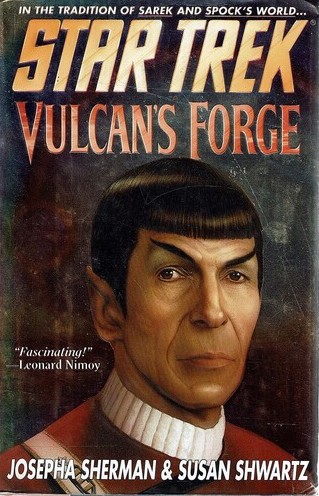
19) Vulcan’s Forge (1997), Josepha Sherman and Susan Shwartz
There are so many Star Trek books. So much so that there is debate as to the actual number (you would think this would be easy to determine, but it is not.) Anyway, what I learned years ago with “tie-in fiction”—and this applies to comic books, too—is that it is the singer, not the song. Your favorite character may be on the cover, but if the writer ain’t great, don’t bother. Sometimes it’s a home run, and great writers are pegged to the best characters, and that is what has happened here with this Spock-centric tale and the team of Sherman and Shwartz. These two NYC Jewesses have Spock say “Shalom” at around page 30, so it is fair to call this masterpiece. (He’s also running around with a Starfleet Captain implied to be a great-great-great-etc grandchild of Yitzahk Rabin.) This is the first of five Spock books they wrote, and you can be sure that used copies have already purchased quite inexpensively via the internet.
20) Reading Myself and Others (1975/1985), Philip Roth
There are three versions of this book. First published in 1975, then expanded in 1985, then reduced (but in a different way) in 2014 when packaged by the Library of America. Anyway, I went with the whole hog because I am a masochist.
All writers, of course, are up their own ass just as much as Roth is, but only he has the guts to publish it. Behold, chapter after chapter of him telling you what a genius he is. Then, as a trick, he’ll write about another author (say, Kafka or Kundera) but it’ll still come back to his work, his insights, his war against his critics. Fair enough. Very engaging and entertaining.
21) The Sands of Mars (1951), Arthur C. Clarke
I read this old, yellow paperback (not sure where I got it, but price sticker on a copy published in the 1970s said $2) on the beach. It crumbled as I turned the pages. Read it in a day, basically. It’s about the first colony on Mars. Terrific stuff. There’s a whole section where the main astronaut, in the year 2000, is dissing a science fiction author whose book from 1973 had been rendered obsolete by reality. Of course this was published in 1951. Needed a slide rule to figure that all out.
22) Zero Gravity (2022), Woody Allen
Woody Allen has now published five books of short stories, and one memoir. This latest—consisting of humor pieces found in The New Yorker magazine up until around 2011, others never seen before—is the worst of the bunch. It still has many, many sections that are slap-your-forehead funny. People who miss the early idiotic Allen from films like Sleeper and Take the Money and Run may not realize that is still to be found in his short fiction. There’s a thing in here written from the POV of a murderous cow. Daphne Merkin’s foreward is embarrassing.
23) The Candy House (2022), Jennifer Egan
There has been some discussion if this is a sequel to A Visit From The Goon Squad. In one way, it is not, because that book was far from a straightforward narrative. You can’t really make a sequel to that sort of thing if you wanted to. The Candy House continues the gimmick of new characters, new POVs for each chapter, tap-dancing around a central theme but not one specific story. But it does touch back to the first book in significant ways, and if you haven’t read it, it would reduce the impact. So, yeah, it’s a sequel. But with both books having 500 characters I still ended up thinking “wait, who is this, again?” Each Google met with an “aha! Oh, yes, yes,” which, considering the subject matter here (a shared internet resource of all our memories and experiences) is maybe some kinda of 10th level metanarrative, who knows?
Anyway, the book: holy shit. Egan is terrifyingly clever, insightful, funny, depressing, the whole package. It’s just fantastic.
24) The Music Never Stops: What Putting on 10,000 Shows Has Taught Me About Life, Liberty, and the Pursuit of Magic (2022), Peter Shapiro with Dean Budnick
I read this because I interviewed the author. I enjoyed it! If you want to know the nitty gritty of what kind of percentage Umphrey’s McGee makes at their merch table, this has the inside scoop for you.
25) Down and Out in Paris and London (1933), George Orwell
I felt itchy during this because of all the bedbugs. Mr. Orwell surely meant well, but would also be cancelled into oblivion for this today. I know I sound like an asshole saying that, but I do find it amusing to read something proudly thumping its chest about the dignity of man one minute, and then a page later is extremely NOT WOKE!
JULY
26) A Horse Walks Into a Bar (2014), David Grossman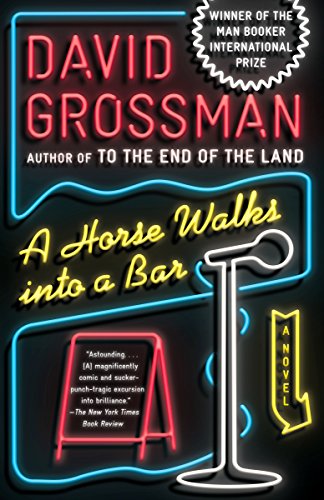
A fiery, riveting, anguished, and, at times, extremely funny novel, centered around a comedy club monologue set. A little bit depressing (I have pretty much flushed “angry comics” from my diet) but ultimately worth it.
27) The Method: How the 20th Century Learned to Act (2022), Isaac Butler
I learned a lot from this one. I learned that nobody really really knows what “the Method” actually is, and never did! And while he may have been a genius that revolutionized art, Konstantin Stanislavsky was responsible for one bomb after another.
AUGUST
28) The Star Dwellers (1961), James Blish
I read this in one day. I was in Brooklyn, on the hottest day of the summer, and I met the band Khruangbin for the finishing touches on a profile I wrote on their co-founder Laura Lee for Vanity Fair. Then I had about six hours to kill before their show in Prospect Park. I sat on a bench and sweated to death and drank so many bottles of Poland Spring. I barely had to whizz because I was sweating it out so much. The human body is incredible.
The first half of this book is good. The second half is shit. It’s pretty standard Cold War sci fi, bracingly sexist; parts of it read like those Charles Atlas ads, aimed toward 14-year-olds (or the 14-year-old within.) I don’t particularly recommend this, but as a spotcheck on mid-century ephemeral pulp, it does have a certain quality.
29) From Counterculture to Cyberculture: Stewart Brand, the Whole Earth Network, and the Rise of Digital Utopianism (2008), Fred Turner
This book was recommended to me by the filmmaker Matt Wolf, who mentioned it when I interviewed him for Vanity Fair when he was promoting his film Spaceship Earth, which I adore. (All of Wolf’s films are good. He’s working on something now about Pee-wee Herman which I am sure will be terrific.) Anyway, this book is informative but dry. It’s a university press, tiny print, thick pages. Much of the subject matter touched on here is given a much more “readable” overview in Jesse Jarnow’s fantastic Heads: A Biography of Psychedelic America. I have no doubt Jarnow used this as a valued source. Anyway, this whole thing—the transition from Haight-Ashbury to Silicon Valley—will always be fascinating to me.
30) Birdseye: The Adventures of a Curious Man (2012), Mark Kurlansky
I love Mark Kurlansky’s food histories. I’ve read his works on salt, cod, and New York City oysters. This is the least of the ones I’ve read, but still enjoyable. For years (years!) I have referred to the act of eating frozen vegetables as “getting down with some Clarence!” Anyway, Clarence Birdseye was an interesting fellow. Like many other American heroes of industry, he ripped off his whole deal from an indigenous culture. (Time in Labrador taught him what he needed to know about freezing his food.)
31) Hot Peppers: Cajun and Capsicum in New Iberia, Louisiana (1980), Richard Schweid
I’m not kidding you, this book is absolutely fantastic. Schweid is a very funny and culturally attuned reporter who dove into Southern Louisiana culture in the 1970s just because he liked Tabasco sauce and wondered if there might be and interesting story behind it. He captures a culture in the middle of tremendous change, and digs into all the fascinating specifics of why so many of us love hot food. He weaves his narrative through horticultural history to knotty aspects of racial injustice and the politics agribusiness. Many colorful characters, I can assure you. There is a newer version of this book that’s been updated (this was all written before “hot sauce” truly boomed) and I’m considering getting it just to read the appendixes.
SEPTEMBER
32) Hear Me Talkin’ to Ya: The Story of Jazz by the Men Who Made It (1955), Nat Hentoff and Nat Shapiro
The mother of all jazz oral histories. How this was put together is still a bit of a puzzle to me—some of it was original reporting, some of it yanked from interviews in, say, Downbeat Magazine. The sourcing is vague. Anyway, who cares—this is great. Everyone and I mean everyone is in this, and man do they have stories to tell. I like how some of the old timers are pretty much convinced that jazz, true jazz, died once Storyville shut down…which was in 1917. Some people just like to complain. This book is so thick and rich it took me forever to read, but I loved it. Highly recommended.
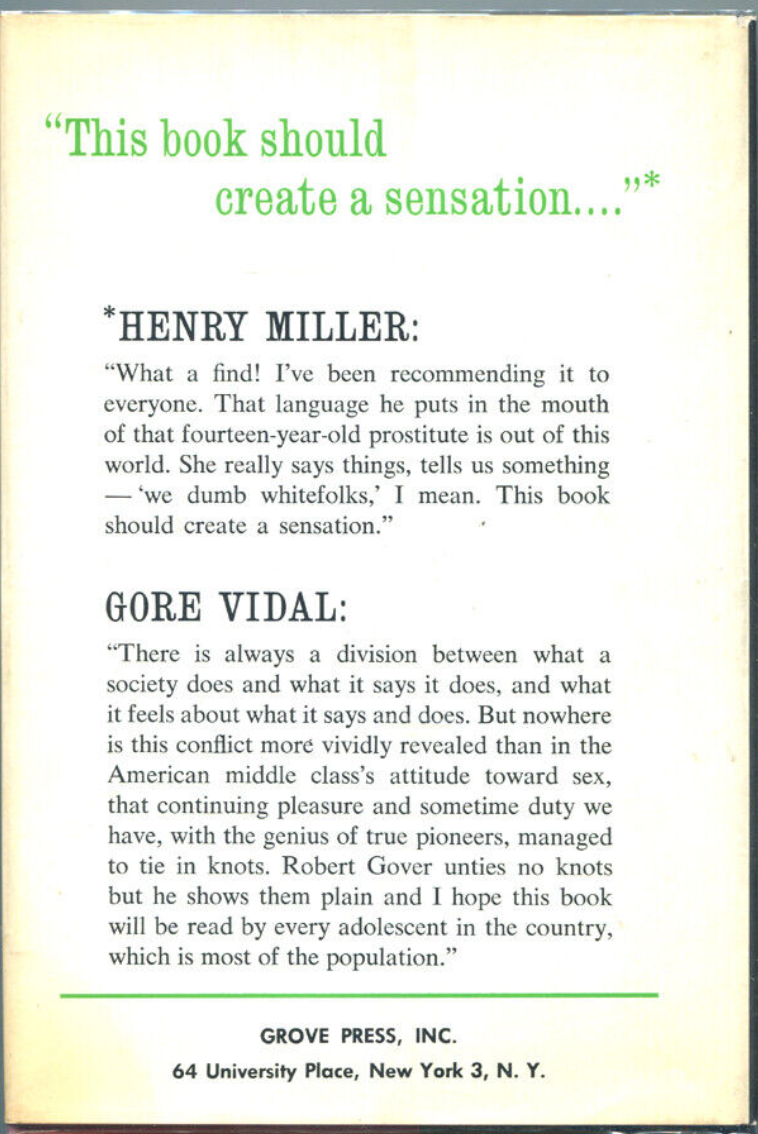
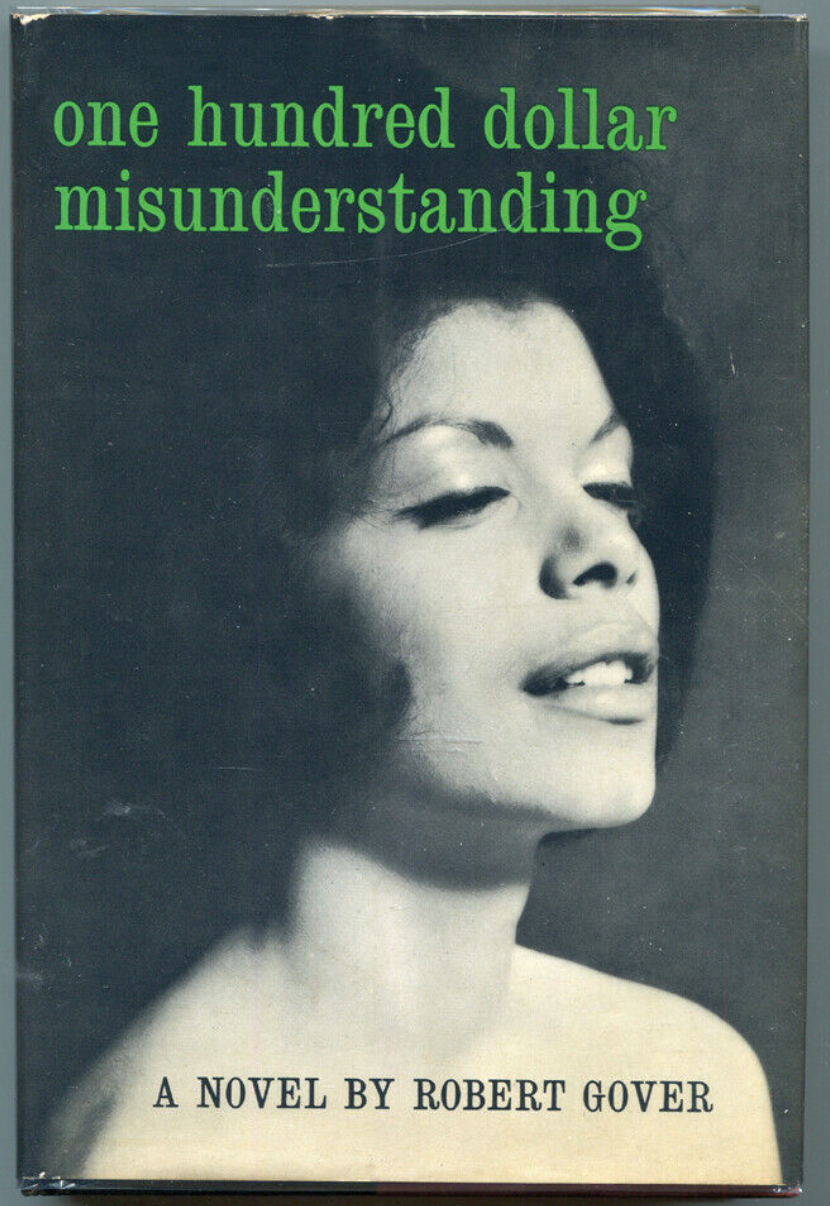
33) One Hundred Dollar Misunderstanding (1961), Robert Gover
Of all the books in my possession, this is the one I’ve been lugging around with me the longest. I was given this by a high school teacher, and I’ve been meaning to get to it for (let me grab my abacus) well, shit, I guess very close to 30 years. That’s ridiculous. The teacher, who died about five or six years after I graduated, was one of those “actual friend” teachers. He taught French but was also one of our theater directors and, senior year, he held a writing workshop. I can’t for the life of me remember why he leant this to me, but I have some ideas. It’s possible that we had been discussing “different voices,” and this book (which I’ll get to in a minute) toggles between two very different narrators in alternating chapters. Or maybe he gave it to me because back then (as now) I had a bit of an interest in 1960s New York, where and when he once lived (and worked in off-Broadway theater), and from which he sometimes regaled me with some stories. (“We got busted smoking grass at Radio City Music Hall watching Fantasia…”). This isn’t set in New York, though, so I can’t really say why this all happened.
Here’s the funny thing. If a teacher gave a student this kind of book today, they’d be highlighted on Tucker Carlson. The story is about a 14-year-old Black prostitute and her dummy privileged college-aged trick. The sex scenes are mostly implied (and, in classic Grove Press form, there’s ample use of the word “fug”) but this is what one might call “a dirty book.” It’s also horrendously dated from a racial point of view, even though I think the author had good intentions for the period. There are blurbs on the back extolling the writing from Henry Miller and Gore Vidal. It’s a fun read if you can keep perspective in mind.
I wish I had read this back when it was given to me. I don’t know what my deal was. I just held on to it, and eventually graduated and packed it up in a box every time I’ve moved apartments. I had this with me in the dorm, even, just sitting there untouched on the shelf. Mr. B., if your spirit is out there, I apologize. I still think of you fondly from time-to-time. You were hilarious and inspiring, even that one time you yelled at me in front of the whole school for being obnoxious (I deserved it.)
34) Led Zeppelin IV (2005), Erik Davis
I loved this 33 ⅓ monograph about the fourth Led Zeppelin album (which is not really called “IV” but I can’t figure out how to clip-and-paste the four symbols.) Among the many things I came away with was recognizing just how terrific ALL FOUR members of this group were. John Paul Jones, the George Harrison of the band, is so much more clutch than we realize. And I’ve finally realized that Jimmy Page’s strength as a guitar player is his POWER more than his technique. In summoning his “guitar army,” as Davis puts it. I adore the close read here, and looking for clues in the heavy lyrics. What a joy.
34) My Year of Rest and Relaxation (2018), Otessa Moshfegh
I found this extremely entertaining. The ending kinda falls apart, but I don’t really have any suggestions on how to fix that. I hope to read another O.M. book soon, I am now a fan.
OCTOBER
I read no books in October. I seek neither forgiveness nor scorn. October 2022 was a bit of an insane month.
NOVEMBER
35) The Great Railway Bazaar: By Train Through Asia (1975), Paul Theroux
I loved this book so much I would sometimes put it down, pace around the room, and pick it up again. That’s how much it excited me. It’s curmudgeonly tone would probably not fly with many readers today, but that doesn’t mean it isn’t electrifying. Like Mark Twain’s “The Innocents Abroad,” this is a travel book written by a guy who kinda sneers at everything? Very entertaining.
DECEMBER
36) The Three-Body Problem (2008), Cixun Liu
Well, I sure as shit didn’t hit my goal of 52. Nobody’s fault but mine. Maybe next year I’ll include magazines and comic books to my end-of-year reading list, to make it seem as if I accomplished more.
Anyway, as expected, I freaking love this book. The sci fi elements are totally whacko (the human computer! the dehydrated Trisolarians!) and the look at 20th century Chinese history is fascinating, too. Boy, that Cultural Revolution sure was something. It is true that the overall flow of this novel is a little unusual, but my cursory research tells me that this is just kinda how Chinese science fiction is done, and that if I felt that the shifting structure (sudden changes in POV or even formatting) was odd, this was just my Western blinders. I’ll take it! What in the hell is the point in reading anything if not to be immersed in other cultures and perspectives. Not to get all Star Trek on you at the end of the year, but I still believe that Infinite Diversity in Infinite Combinations is a feature, not a bug.
I will definitely continue on to book two of this series, probably in summer. I can see myself really digging this during those few rare days I have at the beach. (Not that this is “beach reading”—it is kinda dense and complicated, but in only the best ways.)

Trackbacks/Pingbacks